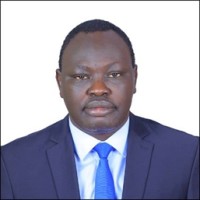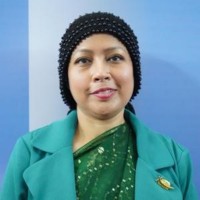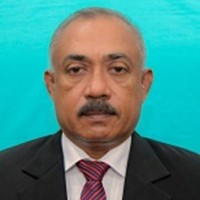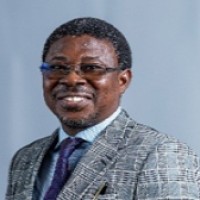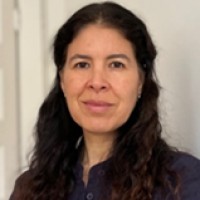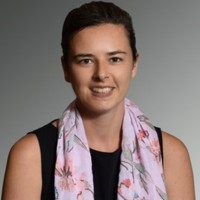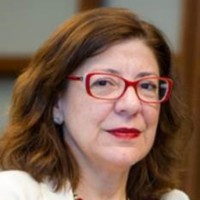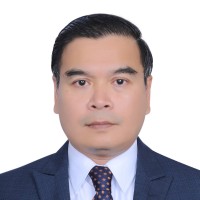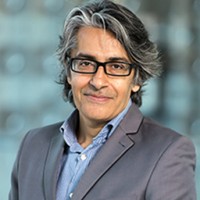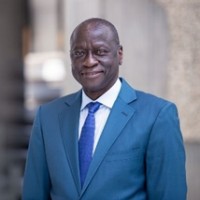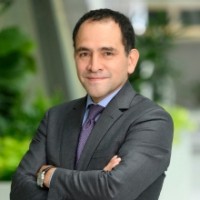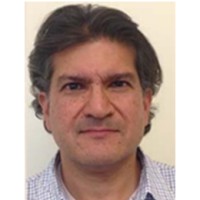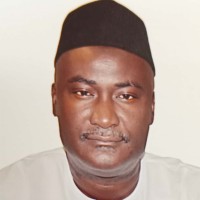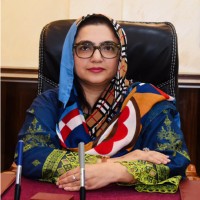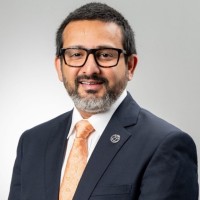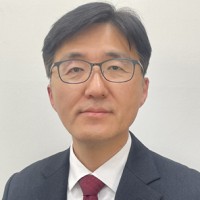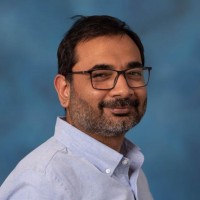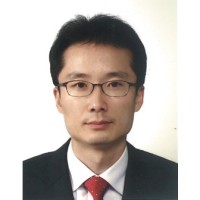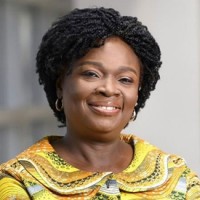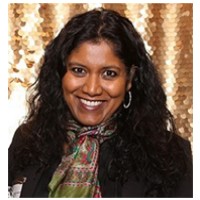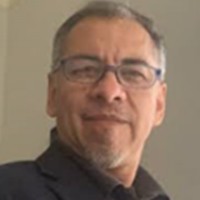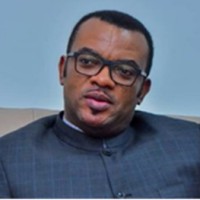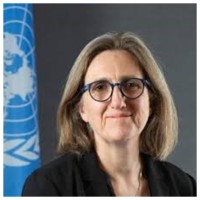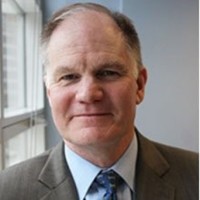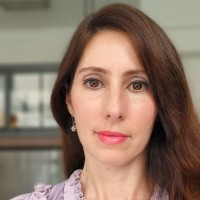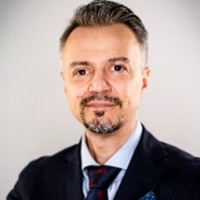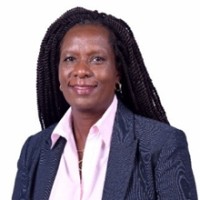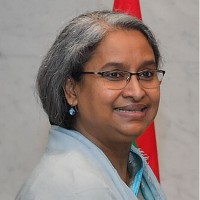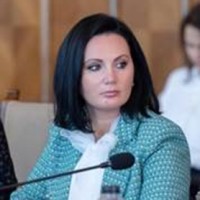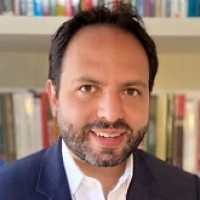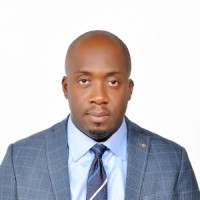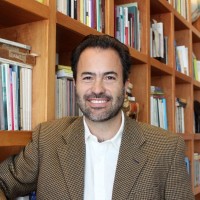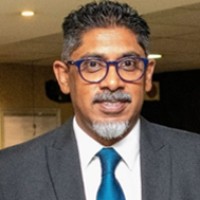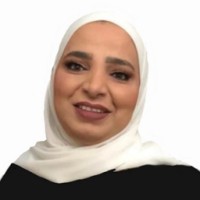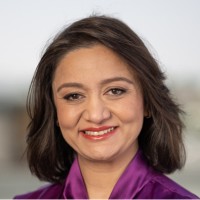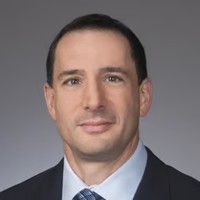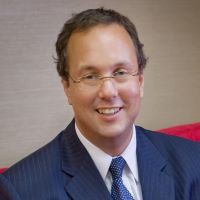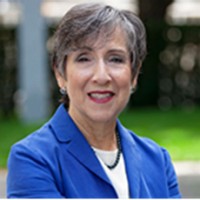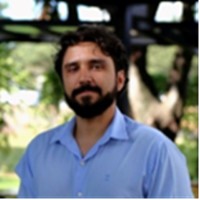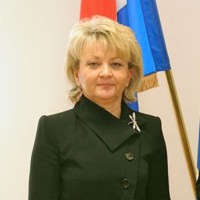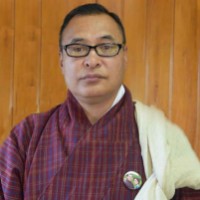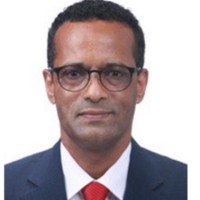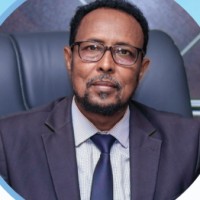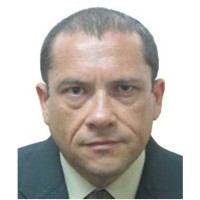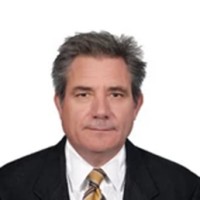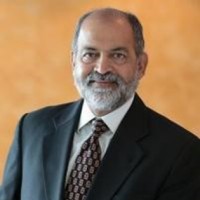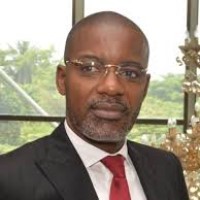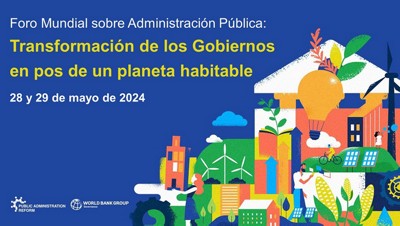 Public Admin Forum Card SP
Public Admin Forum Card SP
- Resumen
- Panorama general
- Día 1
- Día 2
- Café mundial
- Oradores
- Conviértase en un socio
FECHAS: 28-29 de mayo del 2024
UBICACIÓN: Sede del Banco Mundial
Gracias por hacer de este evento un éxito: ¡LAS GRABACIONES ESTARÁN DISPONIBLES EN LAS PÁGINAS DEL EVENTO PRONTO!
Las administraciones públicas eficaces son fundamentales para lograr un mundo sin pobreza en un planeta habitable. Ante la creciente demanda de servicios gubernamentales cada vez más complejos por parte de los ciudadanos, junto con las crecientes presiones fiscales y un creciente déficit de confianza entre los ciudadanos y sus administraciones públicas, se necesita urgentemente un cambio de paradigma en los enfoques para mejorar el desempeño de la administración pública. En reconocimiento de este desafío, el Banco Mundial invita a líderes mundiales, expertos y profesionales a participar en el Foro Mundial de Administración Pública sobre la Transformación de los Gobiernos para un Planeta Habitable, que se celebrará en la ciudad de Washington el 28 y 29 de mayo de 2024.
Para obtener más información, consulte el programa detallado en las pestañas del día 1 y el día 2 de este sitio web.
El Foro es organizado por el Programa Global de Reforma de la Administración Pública del Banco Mundial, que consta dentro de la Práctica Global de Gobernanza, y copatrocinado por el Ministerio del Interior y Seguridad de la República de Corea (i); el Ministerio de Relaciones Exteriores de la República de Estonia (i); Centro Latinoamericano de Administración para el Desarrollo (CLAD); Escola Nacional de Administração Pública (ENAP); Programa de las Naciones Unidas para el Desarrollo (PNUD); Escuela de Gobierno Blavatnik, Universidad de Oxford (i); Centro sobre Democracia, Desarrollo y Estado de Derecho, Instituto Freeman Spogli de Estudios Internacionales, Stanford (CDDRL) (i); Transparencia Internacional (i); el Instituto Chandler de Gobernanza (i); y apolítico (i).
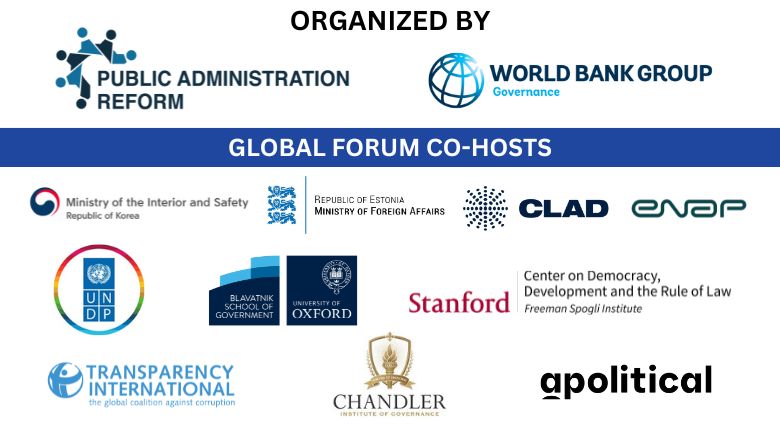
Día 1: martes 28 de mayo de 2024
| ¡Las grabaciones de las sesiones estarán disponibles en breve! Por favor, mire este espacio | |
08:00 |
Desayuno e inscripción |
09:00 |
Palabras de apertura (Preston Auditorium)
|
09:15 |
Sesión plenaria 1: Restaurar la confianza en la administración pública (Preston Auditorium)
Moderador: Martin Raiser, vicepresidente regional del Banco Mundial |
Pausa |
|
11:00 |
Reformas de la administración pública en acción: World Café (Preston Auditorium) Presentación de iniciativas innovadoras del Banco Mundial y de socios. |
12:00 |
Discurso principal: Transformación de los Gobiernos en pos de un planeta habitable (Preston Auditorium) Ver el vídeo
Comentarista: Arturo Herrera Gutiérrez, director global, Práctica Global de Gobernanza, Banco Mundial |
13:00 |
Almuerzo |
14:00 |
Sesión plenaria 2: Gestión de la adopción de tecnologías emergentes en el ámbito público (Preston Auditorium)
Moderador: Junaid Kamal Ahmad, vicepresidente de Operaciones del Organismo Multilateral de Garantía de Inversiones (MIGA), Banco Mundial |
15:30 |
Pausa |
16:00 |
Sesiones de análisis exhaustivo: El papel de las reformas de la administración pública para abordar los desafíos mundiales A. Mejora de las capacidades institucionales en pos de la mitigación del cambio climático y la adaptación a sus efectos (Preston Auditorium)
Moderador: David Groves, especialista principal en materia de cambio climático, Banco Mundial B. Afianzamiento de los contratos sociales y fortalecimiento de la resiliencia: reformas de la administración pública para la consolidación de la paz (MC C2 350)
Moderador: Spyridon Demetriou, Oficial Superior de Operaciones, Grupo de Fragilidad, Conflicto y Violencia, Banco Mundial C. Conceptualización de nuevos modelos de administración pública para la prestación de servicios de salud (MC 2-800)
Moderador: Mickey Chopra, especialista principal en salud, Salud, Banco Mundial D. Conceptualización de nuevos modelos de administración pública para la prestación de servicios de educación (MC 4-800)
Moderador: Harry Anthony Patrinos, asesor sénior, Educación, Banco Mundial |
17:30 |
Cóctel para hacer contactos (Atrium) |
19:00 |
Fin del día 1 |
Día 2: miércoles 29 de mayo de 2024
| ¡Las grabaciones de las sesiones estarán disponibles en breve! Por favor, mire este espacio | |
07:30 |
Desayuno |
08:30 |
Resumen del día 1 (Preston Auditorium) |
08:45 |
Sesión plenaria 3: Las mujeres en los Gobiernos: Abordaje de los desequilibrios de género en el sector público (Preston Auditorium)
Moderador: Ana María Muñoz Boudet, economista principal, Grupo de Género, Banco Mundial |
09:45 |
Sesiones de análisis exhaustivo: Transformación de los Gobiernos en pos de un planeta habitable A. Trabajar en forma efectiva en contextos con niveles múltiples de gobernanza (MC C2-350)
Moderador: Serdar Yilmaz, gerente de práctica, Práctica Global de Gobernanza, Banco Mundial B. Diseño de mecanismos para la fijación de salarios en el sector público (Preston Auditorium)
Moderador: Fabian Seiderer, gerente de práctica, Práctica Global de Gobernanza, Banco Mundial C. Transformar a los Gobiernos a través de los datos: presentación del Government Analytics Handbook (Manual de la labor analítica gubernamental) y la Encuesta global para funcionarios públicos (MC 4-800)
Moderador: Arianna Legovini, directora, DIME, Banco Mundial D. Fortalecimiento de la rendición de cuentas frente al público e integridad de la administración pública (MC 2-800)
Moderador: Alberto Leyton, gerente de práctica, Práctica Global de Gobernanza, Banco Mundial E. Creación de coaliciones para la reforma: empoderamiento de promotores públicos (MC 5-100)
Moderador: María Poli, consultora sobre coaliciones para promover reformas, Banco Mundial |
11:00 |
Pausa |
11:30 |
Sesión plenaria 4: Reformas de la administración pública en acción: Perspectivas de instrumentación (Preston Auditorium)
Moderador: Arturo Herrera Gutiérrez, director global, Práctica Global de Gobernanza, Banco Mundial |
12:30 |
Almuerzo |
13:30 |
Sesiones de análisis exhaustivo: Transformación de los Gobiernos en pos de un planeta habitable A. Transición a una administración pública competente y profesional (Preston Auditorium)
Moderador: Zahid Hasnain, especialista principal en gobernanza, Banco Mundial B. Propiciar e incentivar la formación y el desarrollo profesional de los funcionarios públicos (MC 2-800)
Moderador: Alma Kanani, gerenta de práctica, Práctica Global de Gobernanza, Banco Mundial C. Innovaciones en GovTech para la reforma de la administración pública (MC 4-800)
Moderador: Daniel Ortega Nieto, especialista principal en gobernanza, Banco Mundial D. Crear un entorno propicio para el desarrollo del sector privado (MC, C2-350)
Moderador: Chiara Bronchi, gerenta de práctica, Práctica Global de Gobernanza, Banco Mundial |
14:45 |
Trabajo conjunto: Alianza mundial para el desempeño de la administración pública en acción (Preston Auditorium)
|
15:45 |
Cierre (Preston Auditorium)
|
16:00 |
FIN DEL FORO |
Café mundial
Martes 28 de mayo de 2024, de 11.00 a 12.00 (hora del este de Estados Unidos), en el Auditorio Preston
INICIATIVAS
Nota: Elija dos iniciativas de su interés y encuentre la mesa de presentación respectiva durante las rondas 1 y 2 de la sesión del Café mundial. (Para obtener más información sobre las otras iniciativas, puede consultar los carteles que se exhiben en el atrio durante todo el Foro).
ACTIVIDADES DEL BANCO MUNDIAL EN LOS PAÍSES
1. Bosnia y Herzegovina: Mejorar la gobernanza para prestar mejores servicios públicos
Presentadores:
- Anamarija Magazinovic, viceministra de Salud, Federación de Bosnia y Herzegovina
- Zuhra Osmanovic-Pasic, especialista sénior en gobernanza, Banco Mundial
2. Camboya: Fortalecer la gestión de las finanzas públicas y el desempeño del sector público para mejorar la prestación de servicios
Presentadores:
- Youk Bunna, secretario de Estado permanente, Ministerio de Administración Pública, Camboya
- Chhy Vichara, subsecretaria de Estado, Ministerio de Administración Pública, Camboya
- Sokbunthoeun So, especialista sénior en sector público, Banco Mundial
3. Croacia: Reforma del mecanismo de fijación de salarios del sector público
Presentadores:
- Visnja Tafra, directora, Dirección del Sistema de Función Pública, Ministerio de Justicia y Administración Pública, Croacia
- Anita Zirdum, jefa del Sector de Relaciones Laborales Colectivas y Cooperación Internacional en el Ámbito del Trabajo, Ministerio de Trabajo, Sistema de Pensiones, Familia y Política Social, Croacia
- Pedro Arizti, especialista sénior en sector público, Banco Mundial
4. República Democrática del Congo: Proyecto de Mejoramiento de la Recaudación de Ingresos y la Gestión de Gastos
Presentadores:
- Jean-Pierre Lihau, viceprimer ministro, ministro del Servicio Civil, Modernización de la Administración e Innovación de los Servicios Públicos, República Democrática del Congo
- Ruxandra Burdescu, especialista principal en gobernanza, Banco Mundial
5. India: Proyecto de Mejora de la Capacidad de la Administración Pública (Misión Karmayogi)
Presentadores:
- Adil Zainulbhai, presidente, Comisión de Fortalecimiento de la Capacidad, India
- Neha Gupta, especialista sénior en sector público, Banco Mundial
6. Marruecos: Programa de Desempeño del Sector Público
Presentador(a):
- Lili Sisombat, especialista sénior en gobernanza, Banco Mundial
7. Rumania: Desarrollo de un sistema unitario de gestión de recursos humanos dentro de la administración pública
Presentadores:
- Lavinia Niculescu, secretaria general, Organismo Nacional de Funcionarios Públicos, Rumania
- Dimitrie Mihes, especialista en gobernanza, Banco Mundial
8. Arabia Saudita: Gestión del desempeño en el Reino de Arabia Saudita: Toma de decisiones basada en pruebas mediante el mejoramiento de los indicadores de desempeño
Presentadores:
- Rashed Al-Qaood, director general, Centro Nacional para la Medición del Desempeño (Adaa), Reino de Arabia Saudita
- Ali Halawi, especialista sénior en gobernanza, Banco Mundial
9. Somalia: Proyecto de Financiamiento de los Costos Recurrentes y la Reforma: Fase III
Presentadores:
- Saleiman Umar, director general de Finanzas, Ministerio de Finanzas, Somalia
- Alma Nurshaikhova, especialista sénior en sector público, Banco Mundial
- Lucy Musira, especialista sénior en sector público, Banco Mundial
10. Uruguay: Implementación del sistema de facturación electrónica para proveedores del sector público
Presentadores:
- Elena Martirena, gerenta de proyecto del Sistema Informático de Recepción de Factura Electrónica, Contaduría General de la Nación, Ministerio de Economía y Finanzas, Uruguay
- Daniel Lafitte, gerente, Dirección General Impositiva, Uruguay
- Silvana Kostenbaum, especialista sénior en sector público, Banco Mundial
INICIATIVAS DE LOS COANFITRIONES DEL FORO
11. Escuela de Gobierno Blavatnik, Universidad de Oxford: Enfoques basados en datos para el mejorar el desempeño de la administración pública internacional
Presentador(a):
- Kathy Hall, directora general, Escuela de Gobierno Blavatnik, Universidad de Oxford
12. Apolitical: Compromisos y habilidades pioneras para el futuro
Presentador(a):
- Lisa Witter, cofundadora de Apolitical y directora ejecutiva de Apolitical Foundation
13. Institute for State Effectiveness: Qué, cuándo y cómo: Comprender la secuencia de las reformas en momentos cruciales
Presentador(a):
- Pat Austria Ramsey, director de Prácticas Nacionales e Innovación, Institute for State Effectiveness
14. Transparencia Internacional: Qué, cuándo y cómo: Comprender la secuencia de las reformas en momentos cruciales
Presentadores:
- Mary Addah, directora ejecutiva, Iniciativa de Integridad de Ghana
- Daniela Patiño, jefa de Recursos Públicos, Transparencia Internacional
15. Programa de las Naciones Unidas para el Desarrollo (PNUD): Sello de Igualdad de Género para Instituciones Públicas
Presentador(a):
- David Davisson, especialista en el Sello de Igualdad de Género para Instituciones Financieras, PNUD
16. Chandler Institute of Governance: ¿Qué es el “buen” gobierno? Una perspectiva desde las capacidades
Presentadores:
- Wu Wei Neng, director ejecutivo, Chandler Institute of Governance
17. MasterCard: Mastercard para el Gobierno
Presentadores:
- Steve Tae, vicepresidente de Instituciones Internacionales, Mastercard
- Stephanie Vak-Stephens, directora de Instituciones Internacionales, Mastercard
INICIATIVAS INTERNACIONALES DEL BANCO MUNDIAL SOBRE CONOCIMIENTOS
18. Indicadores de Burocracia Mundial
Presentador(a):
- Flavia Sacco, economista, Impacto en el Desarrollo, Grupo Banco Mundial
19. Escala salarial para el sector público
Presentador(a):
- Faisal Baig, especialista en sector público, Práctica Global de Gobernanza, Grupo Banco Mundial
20. Encuesta Mundial de Empleados Públicos
Presentadores:
- Daniel Rogger, economista sénior, Impacto en el Desarrollo, Grupo Banco Mundial
- Christian Schuster, profesor de Gestión Pública, University College de Londres
21. Programa de Gasto Público y Rendición de Cuentas (PEFA)
Conviértase en socio del Programa Global para el mejoramiento del desempeño de la Administración Pública
El Programa Global para el mejoramiento del desempeño de la Administración Pública es una iniciativa del la Práctica Global de Gobernanza del Banco Mundial, puesto en marcha en 2023. El objetivo de este programa es proporcionar liderazgo analítico e intelectual para promover las reformas de la administración pública en las áreas de mejora de las estructuras organizativas del gobierno para la formulación y aplicación de políticas; empleo y remuneración del sector público; la gestión de la fuerza laboral del sector público; y el uso de GovTech, tanto de los sistemas digitales como de las reformas que propician el desarrollo de habilidades digitales y una cultura organizacional de innovación. Para obtener más información sobre el programa, haga clic aquí.
Buscamos colaborar con organizaciones alineadas con nuestros objetivos. Al convertirse en socias del programa, las organizaciones pueden ampliar su impacto a través de los conocimientos y recursos colectivos de otros miembros, incluidos los del Banco Mundial. Los asociados se benefician del intercambio de conocimientos, la organización conjunta de eventos y la creación de soluciones innovadoras para los desafíos frecuentes de la reforma de la justicia. Esta colaboración aumenta la visibilidad de las contribuciones de cada asociado al centrarse en las brechas de conocimientos existentes, con lo que se evita la duplicación de esfuerzos y se fomenta la cooperación eficaz entre las organizaciones.
Si usted y su organización están interesados en convertirse en socios, complete este formulario: http://wrld.bg/s71b50RUm7e o escanee este código QR:

El equipo del Programa examinará su solicitud y se comunicará con usted a la brevedad.
¡Esperamos poder colaborar con usted!
Fecha: Mayo 28 - 29, 2024 ET
Lugar: Washington, D.C.

